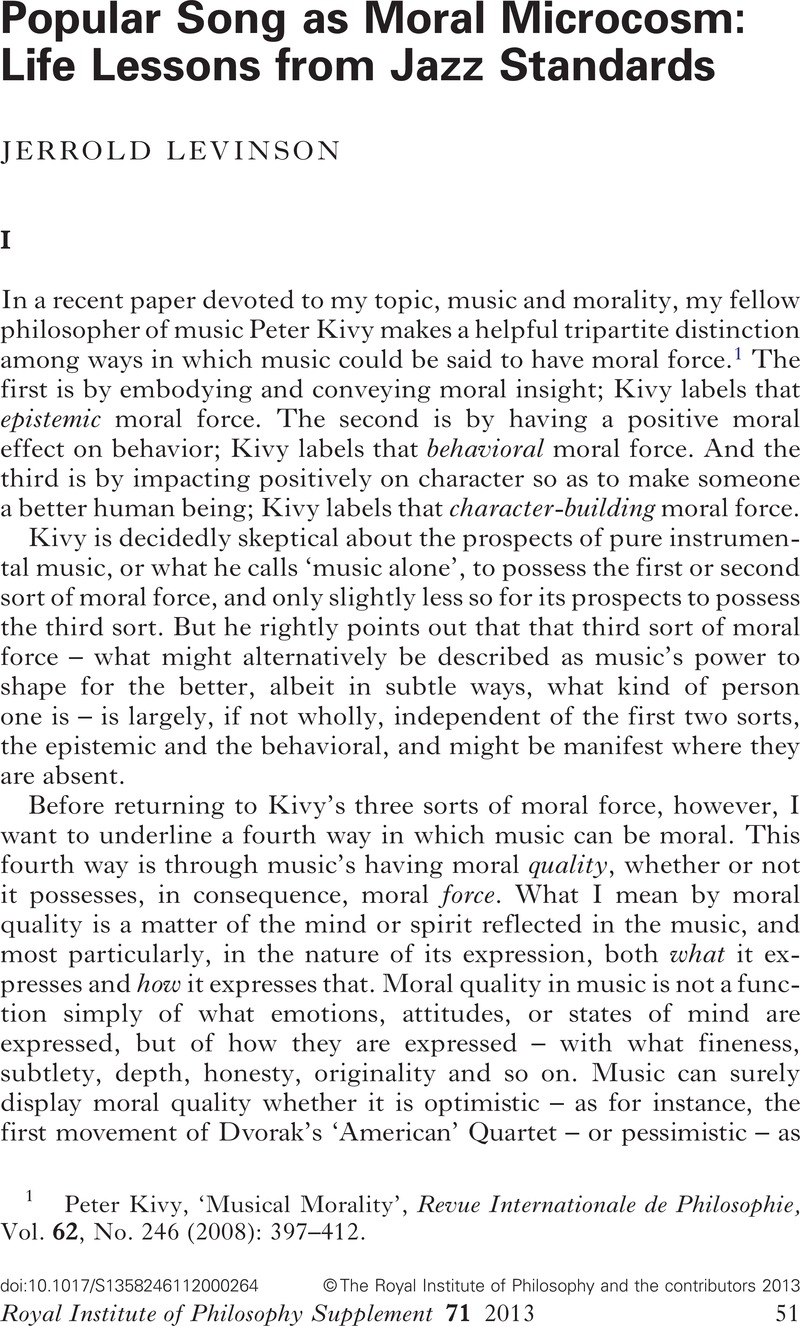Published online by Cambridge University Press: 11 March 2013

1 Kivy, Peter, ‘Musical Morality’, Revue Internationale de Philosophie, Vol. 62, No. 246 (2008): 397–412Google Scholar.
2 I here echo the claim made by Booth, Wayne on behalf of great literature in his well-known book The Company We Keep (University of California Press, 1988)Google Scholar.
3 For further reflections in this vein, see my ‘Evaluating Music’, in Contemplating Art (Oxford University Press, 2006)Google ScholarPubMed.
4 Ibid., 411–2.
5 See my ‘Sound, Gesture, Space, and the Expression of Emotion in Music’ and ‘Musical Expressiveness as Hearability-as-Expression’, in Contemplating Art, op. cit.
6 Nor do I mean to suggest that ethical quality is the exclusive prerogative of songs in the repertoire from which I draw my examples. Many songs from the rock, folk, and blues genres also exhibit such quality. Consider Leonard Cohen's ‘Everybody Knows’, whose poetic cynicism, smooth transitions from global to personal concerns, jewel-like mandolin accompaniment, and rich background vocals all contribute to its ethical impact.
7 To note just one respect in which the music of ‘You Go to My Head’ is not only beguiling on its own terms, but incredibly well-fitted to the sentiment of its lyric, the octave leaps at the beginning of the vocal line at each of three stanzas of the chorus are a perfect sonic emblem of the intoxicating effect of which the lyric so eloquently speaks.
8 Another song that foregrounds that idea is Gershwin's ‘A Foggy Day’.
9 Alec Wilder, an authority on American popular song, offered this encomium of ‘Day In, Day Out’, one that responds to its special quality from a somewhat different, yet entirely compatible, angle: ‘I was astounded by both the melody and the lyric…It was unlike any song in the pop field I'd ever seen…fifty-six measures long. The melodic line soared and moved across the page like a lovely brush stroke. It never knotted itself up in cleverness or pretentiousness. And it had, remarkable for any pop song, passion.’ (Quoted in Furia, Philip, The Poets of Tin Pan Alley (Oxford University Press, 1992), 122Google Scholar.)
10 A strong second-place showing, however, must be accorded at least three other songs from this repertoire, ‘Angel Eyes’, ‘Estate’, and ‘When Your Lover Has Gone'.
11 The main key of the song is Ab major, while the bridge is in G major, only a half-tone down but harmonically quite remote from Ab. What is especially hard to negotiate for a singer is the transition from the last note of the main section to the first note of the bridge, separated by the bedeviling interval of a tritone.
12 I note here the rather unsympathetic, and in my opinion obtuse, view of this song taken by Philip Furia. (See The Poets of Tin Pan Alley, op. cit., 257–8.)
13 ‘I've telegraphed and phoned, and sent an air mail special too. Your answer was goodbye, and there was even postage due. I fell in love just once, and then it had to be with you. Everything happens to me.’ Furthermore, when sung a certain way ‘Everything Happens to Me’ can be redeemed in performance, if the singer manages to neutralize what's unappealing about its persona by inhabiting it in a wistful yet knowing manner. The performance by Chet Baker comes closest, of those I have heard, to achieving that.
14 Perhaps the special satisfaction derived from song is partly rooted in some systemic awareness of the two halves of one's brain being singularly united in the comprehension of what is hearing, on the assumption of the right hemisphere as the main locus of musical processing and the left hemisphere as the main locus of verbal processing.